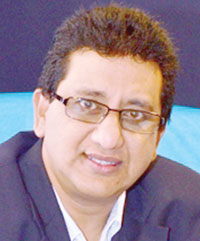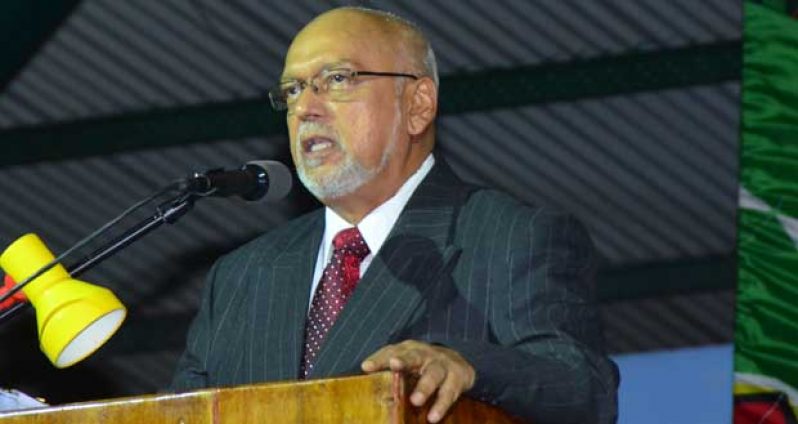Opposition must show a sense of nationalism in the interest of Guyana and Guyanese
… President Ramotar
GUYANA was effectively blacklisted internationally last Thursday, following the announcement by the Caribbean Financial Action Task Force (CFATF) that the country was referred to the international body, the Financial Action Task Force (FATF).The regional watchdog’s review was in relation to the protection of the international financial system from money laundering and financing of terrorism risks, and the encouragement of greater compliance with standards.
“Today, I call upon the opposition to unconditionally pass a CFATF-compliant Bill to limit the harm already done, and the dangers to our people’s wellbeing. I will assent to such a Bill as soon as it is sent to me by the National Assembly.” – President Donald Ramotar
The body made it clear that Guyana has strategic Anti-Money Laundering and Countering the Financing of Terrorism (AML/CFT) deficiencies, and has not made sufficient progress in addressing these.
According to CFATF, in a public statement: “As a result of not meeting the agreed timelines in its Action Plan, the CFATF recognises Guyana as a jurisdiction with significant AML/CFT deficiencies, which has failed to make

significant progress in addressing those deficiencies, and the CFATF considers Guyana to be a risk to the international financial system.”
The enactment of the legislation before CFATF’s meeting last week, by all accounts, could have averted Guyana’s referral to CFATF, particularly since the body noted that 90 per cent of the deficiencies identified are legislative in nature.

To this end, CFATF advised its members to take counter-measures against Guyana to protect their financial systems from the ongoing money laundering and terrorist financing risks emanating from Guyana. The counter measures include: The requirement of enhanced due diligence measures; Introducing enhanced reporting mechanisms or systematic reporting of financial transactions; Refusing the establishment of subsidiaries or branches or representative offices in Guyana; and Taking into account the fact that financial institutions from Guyana that do not have adequate AML/CFT systems and limit the business relationships or financial transactions with the country.
UNCONDITIONAL PASSAGE
President Donald Ramotar has since called for the unconditional passage of the AML/CFT (Amendment) Bill, which has been deemed CFATF complaint.
Mr. Ramotar, on Thursday evening, in an address to the nation, said: “I call upon the Opposition to unconditionally pass a CFATF-compliant Bill to limit the harm already done, and the dangers to our people’s well-being. I will assent to such a Bill as soon as it is sent to me by the National Assembly.”
“The entire world recognises the importance of being in good standing with FATF, except the 33 persons who sit opposite us in Parliament.” – Finance Minister, Dr. Ashni Singh
The combined Opposition, A Partnership for National Unity (APNU) and the Alliance For Change (AFC), are calling for certain conditions to be met before they do so.
APNU, for instance, has proposed three amendments that proffer a change to the entire governing apparatus of the Financial Intelligence Unit (FIU), two of which are the removal of the words Attorney-General wherever it appears and replacing it with the acronym, FIU; and vesting a Police or Customs Officer with the power to seize currency from any person, anywhere in Guyana, if those officers have reason to believe that it is the proceeds of crime, or will be used to fund criminal activities. The Party is also calling for President Donald Ramotar to assent to Bills passed in the National Assembly, through the Opposition’s one-seat majority, but as the Head of State was at pains to explain, those calls are unconstitutional.
Given that the APNU’s proposals were viewed as problematic, the Attorney-General (AG), Anil Nandlall, on behalf of the Government, earlier this month offered them counter-proposals, in the interest of ensuring that the amendments made are CFATF-compliant, and reaching a compromise. These counter-proposals are being considered by the Parliamentary Select Committee, which has been reviewing the AML/CFT Bill for more than 12 months now, and held its most recent meeting on May 22, 2014.
The APNU maintains its position on conditional support for the Bill. On the other hand, the AFC, which is fully behind APNU’s position, is demanding the establishment of the PPC (Public Procurement Commission), which the government has agreed to, providing that Cabinet retains its no-objection role in the process; but the latter position has been rejected by the AFC
AFC’S ABOUT FACE
However, on Thursday evening, after the announcement by CFATF, the AFC, in a statement, noted that it is now willing to budge on its position and support Cabinet’s retention of its no-objection role.
The party committed to a compromise by amending Section 54 of the Procurement Act so that Cabinet’s right to raise an objection on the award of contracts is enshrined, something it had previously objected to.
“I am happy that the parties have finally arrived at this position (a willingness to compromise); but, as they did with the Amaila Falls, they waited until the hammer has fallen on Guyana and then they are now pretending to ride in like the knight in shining armour to save the country from the very disaster which they have put us in.” – AG, Anil Nandlall
The Procurement (Amendment) Bill 2013 was read the first time in the National Assembly last November, and aims to amend the 2003 principal Procurement Act by making changes to section 54 by deleting subsection six – effectively restoring Cabinet’s no-objection role. Section 54 deals with Cabinet’s involvement in reviewing the award of procurement contracts and the phasing out of its functions with the establishment of a Public Procurement Commission (PPC), in the interest of decentralising the procurement process.
Finance Minister, Dr. Ashni Singh expressed his dissatisfaction at the timing of the proposal by the Alliance For Change.
“The AFC’s offer is too little too late,” he said, before going on to explain that the AFC’s proposal is an impossibility in the time-frame stipulated, since the Procurement (Amendment) Bill 2013, which ensures Cabinet’s no-objection role, has to be passed in the National Assembly; after which the nominations by each Party have to be approved by the PAC.
More importantly, he said, even if the proposal was to be seriously considered, the establishment of the PPC requires a two-thirds majority in the National Assembly, and the AFC and the ruling party only constitute a 60 per cent majority.
Dr. Singh said: “The entire world recognises the importance of being in good standing with FATF, except the 33 persons who sit opposite us in Parliament. If you speak to anyone in the world, they would say it is a grave matter. The Opposition in Guyana says we are crying wolf; nothing will happen; and no one will be affected.
“The truth is that there are people today who cannot do international transactions; they cannot make international payments; the staffers of international agencies here are affected… There are people who are affected right now. There are people who say to me that the cost to send remittances have gone up because of increased scrutiny and greater due diligence.”
Also, commenting on the positions of the two parties, the Attorney-General said: “I am happy that the parties have finally arrived at this position; but, as they did with the Amaila Falls, they waited until the hammer has fallen on Guyana and then they are now pretending to ride in like the knight in shining armour to save the country from the very disaster which they have put us in.
“In any event, I am not impressed by anything the AFC or the APNU says in terms of political commitment. My personal experience has been that the combined Opposition has violated and disregarded every political accord they have struck with the Government since November 2011.”
TIME FRAME
Additionally, on Thursday, the AFC indicated that the AML/ CFT (Amendment) Bill can be passed within 72 hours; a position taken on by APNU, which on Friday said it can be done in 48 hours.
The President, on Friday evening, returned that the legislation can be passed within 24 hours to save Guyanese from the hardships of the consequence of the country being internationally blacklisted.
The Guyanese Head of State is of the view that it can be done on the premise that the Bill, currently languishing at the level of the Special Select Committee of Parliament, has been deemed compliant by the Caribbean Financial Action Task Force (CFATF).
Mr. Ramotar said the Bill’s passage can be achieved if the Opposition parliamentary parties were to “show a sense of nationalism in the interest of Guyana and Guyanese”.
He bemoaned Guyana’s current predicament given the repeated calls from not only Government, but from the private sector and financial sector stakeholders, as well as regional organisations, including the Caribbean Community (CARICOM), and the diplomatic corps.
Notable, also, is the fact that in February, CFATF Advisor, Roger Hernandez, was invited to look at the Opposition’s amendments, and during a meeting held of the Special Select Committee, Hernandez expressed the view that the Opposition’s amendments were not CFATF compliant. The regional body’s chair, Attorney General of The Bahamas, Allyson Maynard-Gibson, in April, led a team to Guyana for discussions on AML/CFT (Amendment) Bill. Calls for the passage of the embattled legislation were ignored on both occasions.
FATF’s next plenary meeting is slated for June 23 to 25, 2014 in Paris, France, at which time the international body is likely to put Guyana up for review by its International Cooperation Review Group (ICRG).
(By Vanessa Narine)











